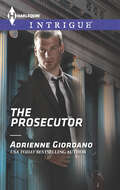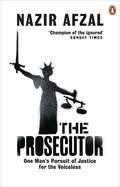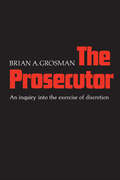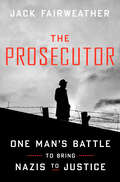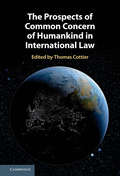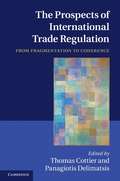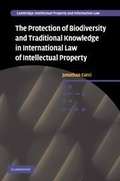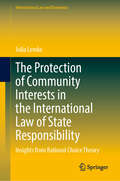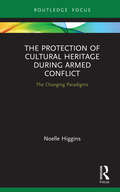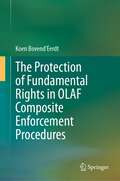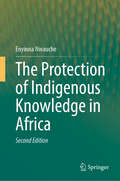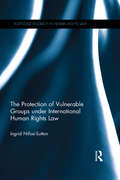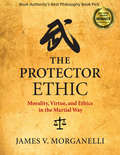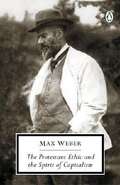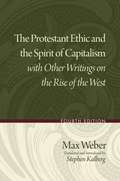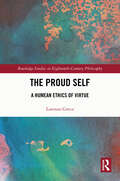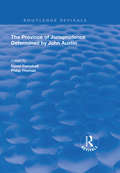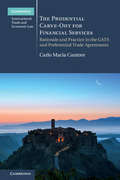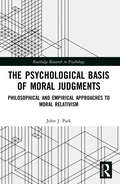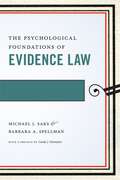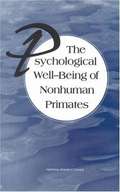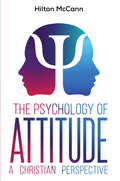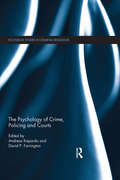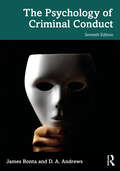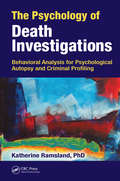- Table View
- List View
The Prosecutor
by Adrienne GiordanoA Chicago law student tangles with a sexy attorney as she works to free an innocent man in this romantic suspense tale by a USA Today–bestselling author. Chicago assistant state’s attorney Zac Hennings just got handed a political hot potato: keeping the convicted murderer in a high-profile case behind bars. He’s up against his most formidable—and alluring—adversary. First-year law student Emma Sinclair is passionately fighting to free her brother. But she needs the take-no-prisoners prosecutor’s help.Caught between attraction and letting a killer go free, Zac walks a tightrope. Until evidence surfaces that the real culprit’s still out there. With his career and Emma’s life on the line, Zac races to right a terrible wrong. Refusing to back down, he’ll bring a cunning lawbreaker to justice—or die trying.
The Prosecutor
by Nazir AfzalThe outsider who transformed our justice systemNazir Afzal knows a thing or two about justice. As a Chief Prosecutor, it was his job to make sure the most complex, violent and harrowing crimes made it to court, and that their perpetrators were convicted. From the Rochdale sex ring to the earliest prosecutions for honour killing and modern slavery, Nazir was at the forefront of the British legal system for decades.But his story begins in Birmingham, in the sixties, as a young boy facing racist violence and the tragic death of a young family member - and it's this that sets him on the path to his groundbreaking career, and which enables him to help communities that the conventional justice system ignores, giving a voice to the voiceless.A memoir of struggle and survival as well as crime and punishment, The Prosecutor is both a searing insight into the justice system and a powerful story of one man's pursuit of the truth.
The Prosecutor: An Inquiry into the Exercise of Discretion
by Brian A. GrosmanEvery day decisions made by prosecutors, before trial takes place, critically affect the rights of citizens; yet these decisions remain a grey area in the administration of criminal justice. In fact, there are considerable and important differences between what the prosecutor does and what the legal literature and judicial decisions say he should do. Very little is known about the powers wielded by prosecutors and the factors which influence their exercise of discretion. This inquiry focuses on the decision-making role of the prosecutor in pre-trial determinations. Professor Grosman describes and analyses the prosecutor's informal relations with the police and defence lawyers, and the significance these relationships have for the accused and for the fair administration of justice. Other areas examined include the decision to begin prosecution, the negotiated guilty plea, and the prosecutor's administrative bias. The study concludes with recommendations for judicial and legislative reform. Professor Grosman has added a preface to this edition outlining the changes that have occurred in recent years. A lucid and revealing description of the prosecutor's attitudes to criminal prosecution and its operation, this study contributes important insights valuable to lawyers and all those concerned with the administration of justice, and will be of interest to everyone concerned with social problems.
The Prosecutor: One Man's Battle to Bring Nazis to Justice
by Jack FairweatherFrom the #1 Sunday Times bestselling author of The Volunteer, the powerful true story of a Jewish lawyer who returned to Germany after World War II to prosecute war crimes, only to find himself pitted against a nation determined to bury the past.At the end of the Nuremberg trial in 1946, some of the greatest war criminals in history were sentenced to death, but hundreds of thousands of Nazi murderers and collaborators remained at large. The Allies were ready to overlook their pasts as the Cold War began, and the horrors of the Holocaust were in danger of being forgotten.In The Prosecutor, Jack Fairweather brings to life the remarkable story of Fritz Bauer, a gay, Jewish judge from Stuttgart who survived the Nazis and made it his mission to force his countrymen to confront their complicity in the genocide. In this deeply researched book, Fairweather draws on unpublished family papers, newly declassified German records, and exclusive interviews to immerse readers in the shadowy, unfamiliar world of postwar West Germany where those who implemented genocide run the country, the CIA is funding Hitler&’s former spy-ring in the east, and Nazi-era anti-gay laws are strictly enforced. But once Bauer landed on the trail of Adolf Eichmann, he wouldn&’t be intimidated. His journey took him deep into the dark heart of West Germany, where his fight for justice would set him against his own government and a network of former Nazis and spies bent on silencing him.In a time when the history of the Holocaust is taken for granted, The Prosecutor reveals the courtroom battles that were fought to establish its legacy and the personal cost of speaking out. The result is a searing portrait of a nation emerging from the ruins of fascism and one man&’s courage in forcing his people—and the world—to face the truth.
The Prospects of Common Concern of Humankind in International Law
by Zaker AhmadThe Common Concern of Humankind today is central to efforts to bring about enhanced international cooperation in fields including, but not limited to, climate change. This book explores the expression's potential as a future legal principle. It sets out the origins of Common Concern, its differences to other common interest legal principles, and expounds the potential normative structure and effects of the principle, applying an approach of carrots and sticks in realizing goals defined as a Common Concern. Individual chapters test the principle in different legal fields, including climate technology diffusion, marine plastic pollution, human rights enforcement, economic inequality, migration, and monetary and financial stability. They confirm that basic obligations under the principle of 'Common Concern of Humankind' comprise not only that of international cooperation and duties to negotiate, but also of unilateral duties to act to enhance the potential of public international law to produce appropriate public goods.
The Prospects of International Trade Regulation
by Thomas Cottier Panagiotis DelimatsisFor a long time, the GATT led a life of its own as a self-contained regime. The evolution from tariff to non-tariff barriers brought about increasing overlaps with other regulatory areas. WTO rules increasingly interface with other areas of law and policy, including environmental protection, agricultural policies, labour standards, investment, human rights and regional integration. Against this backdrop, this book examines fragmentation in international trade regulation across a wide array of regulatory fields. To this end, it uses a conceptually coherent theoretical framework which is based on the effort to bring about greater coherence among different policy goals and fields, and thus to embed the multilateral trading system within the broader framework of international economics, law and relations. It will appeal to those interested in a forward-looking discussion of the most pressing issues of the international trade agenda.
The Protection of Biodiversity and Traditional Knowledge in International Law of Intellectual Property
by Jonathan CurciAs its economic potential has expanded rapidly, intellectual property has become a subject of front-rank legal importance. Cambridge Intellectual Property and Information Law is a series of monograph studies of major current issues in intellectual property. Each volume contains a mix of international, European, comparative and national law, making this a highly significant series for practitioners, judges and academic researchers in many countries.
The Protection of Community Interests in the International Law of State Responsibility: Insights from Rational Choice Theory (International Law and Economics)
by Julia LemkeThis book redefines the traditional understanding of state responsibility. It presents a compelling argument that international law's effectiveness hinges on its ability to protect not only state interests but also those of the global community. Drawing from principles established in the Articles on the Responsibility of States for Internationally Wrongful Acts (ARSIWA), the book examines how states, conceptualised as rational actors, navigate collective action challenges. Through a law and economics lens, it sheds light on the role of international state responsibility in providing global public goods and safeguarding common pool resources. This interdisciplinary book offers valuable insights and normative suggestions for enhancing the ARSIWA's efficacy in promoting community interests. It will appeal to scholars and practitioners in public international law, law and economics, and international relations, interested in a better understanding of international law's role in tackling pressing global issues.
The Protection of Cultural Heritage During Armed Conflict: The Changing Paradigms
by Noelle HigginsThis book analyses the current legal framework seeking to protect cultural heritage during armed conflict and discusses proposed and emerging paradigms for its better protection. Cultural heritage has always been a victim of conflict, with monuments and artefacts frequently destroyed as collateral damage in wars throughout history. In addition, works of art have been viewed as booty by victors and stolen in the aftermath of conflict. However, deliberate destruction of cultural sites and items has also occurred, and the Intentional destruction of cultural heritage has been a hallmark of recent conflicts in the Middle East and North Africa, where we have witnessed unprecedented, systematic attacks on culture as a weapon of war. In Iraq, Syria, Libya, Yemen, and Mali, extremist groups such as ISIS and Ansar Dine have committed numerous acts of iconoclasm, deliberately destroying heritage sites, and looting valuable artefacts symbolic of minority cultures. This study explores how the international law framework can be fully utilised in order to tackle the destruction of cultural heritage, and analyses various paradigms which have recently been suggested for its better protection, including the Responsibility to Protect paradigm and the peace and security paradigm. This volume will be an essential resource for scholars and practitioners in the areas of public international law, especially international humanitarian law and cultural heritage law.
The Protection of Fundamental Rights in OLAF Composite Enforcement Procedures
by Koen Bovend'EerdtThis book focuses on OLAF, the European Union’s anti-fraud office, and examines the role of and challenges concerning fundamental rights in OLAF’s composite enforcement procedure. The mission of OLAF (Office Européen de Lutte Antifraude) is to fight fraud, corruption and any other illegal activities that affect the financial interests of the European Union. To this end, OLAF carries out administrative investigations, in which it gathers evidence itself, and coordination cases, in which it coordinates the Member States’ investigations. OLAF’s investigation and coordination efforts are conceived of as mere derivatives of other more traditional forms of law enforcement cooperation in which authorities enter into obligations to cooperate with one another, but in which each acts to fulfill these obligations within its own separately identifiable legal order and on the basis of its own law. This system, in its most conventional form, is founded on the notion of territorial sovereignty. If we extend the logic of this approach from enforcement (the ‘sword’) to fundamental rights (the ‘shield’), issues in relation to the latter – and the accompanying responsibility to prevent and/or remedy them – can arise only in individual (sovereign) legal orders. The way in which we view OLAF, as an evolved cognate of traditional forms of law enforcement cooperation, therefore directly dictates which fundamental rights issues enter into the equation, and in which manner.This book proposes an innovative way of looking at OLAF, which we refer to as ‘composite enforcement procedures.’ In this type of procedure, responsibilities for the entirety of enforcement are attributed to inextricably interlinked European Union and Member State legal orders. If we observe OLAF through this new lens, fundamental rights issues that would otherwise go unnoticed come to the forefront. These are issues that arise not in individual legal orders, but rather between or among the European Union and the Member States. This book addresses these fundamental rights challenges and makes concrete recommendations on how they can be addressed and resolved.
The Protection of Indigenous Knowledge in Africa
by Enyinna NwaucheThis book provides a comprehensive contemporary and timely account of the protection of indigenous knowledge in Africa by examining issues such as the nature of indigenous knowledge as part of indigenous property and as the fulcrum of indigenous communities in Africa. Acknowledging the centrality of the members of communities of origin in the production and reproduction of indigenous knowledge, this book discusses options to manage the tension between members of the community, communities of origin and their political community. Furthermore, the book abandons the conceptual distinction between ‘negative’ and ‘positive’ protection and turns towards a subject consideration of indigenous Scientific and Technical Indigenous Knowledge (STIK); indigenous heritage; indigenous designs; indigenous music; indigenous audio-visual, indigenous signs expressions and terms as well as the indigenous literary works that are examined within the context of case studies of the indigenous knowledge human and peoples’ rights. The book concludes that Africa’s modest record of the protection of indigenous knowledge must factor in its extensive use as the foundation of Africa’s entertainment industry and recommends a tripod of ‘community’ ‘participation’ and ‘reward as principles of effective protection. Building on the 2017 title of ‘The Protection of Traditional Cultural Expressions in Africa” this book adopts a mixed method of a legal pluralistic account of indigenous knowledge; using intellectual property as a lens to view indigenous knowledge and a cultural production account of indigenous knowledge and will be useful to intellectual property lawyers; sociologists; economists; Africanists; innovation law and policy specialists and legal practitioners.
The Protection of Vulnerable Groups under International Human Rights Law (Routledge Research in Human Rights Law)
by Ingrid Nifosi-SuttonThe protection of vulnerable groups varies under international human rights law. Depending on the group at stake, protection may be more or less advanced. In some cases, the international community has deemed it necessary to adopt conventions providing for the rights of certain vulnerable groups and establishing mechanisms to verify State compliance. Other groups have not been the focus of States’ standard-setting endeavours, but their protection still falls within the scope of human rights treaties of general application and the mandate of their respective monitoring bodies. This book takes an innovative approach to the investigation of the international legal protection of vulnerable groups. Rather than examining the situation of a number of vulnerable groups and applicable international or regional conventions, this book reviews the overall scope of the protection of vulnerable groups under International Human Rights Law. This book conceptualizes the protection of vulnerable groups as an underlying and essential component of International Human Rights Law through a systematic and comprehensive analysis of international human rights law instruments and relevant practice of international and regional human rights monitoring bodies. The book illuminates how human rights monitoring bodies foster protection of vulnerable groups and their members at the domestic level, and underscores and assesses vulnerability paradigms these bodies have elaborated. The book also puts forward a legal definition of vulnerable groups. This book will be of great interest to students and scholars of international human rights law.
The Protector Ethic: Morality, Virtue, and Ethics in the Martial Way
by James V. MorganelliDiscover how the martial way leads to a protector ethic The Protector Ethic is a deep dive exploring the principles and values that must anchor a modern warrior. The author is compelling, insightful, and not afraid of controversy. As the book begins, we are thrust into the true story of a robbery turned homicide. It happens midday on a train. The victim is twenty-four, and the murderer is eighteen. What unfolds is nothing short of horrific, yet the other passengers refuse to help. James V. Morganelli sees this as a symptom. When we are reluctant to defend ourselves, when we refuse to protect those around us, we become part of the disease. As a martial artist and ethicist, the author says martial arts are much more than technical exercises. They offer us a “physical philosophy”—one that allows us to understand ourselves, teaches us about others, and demonstrates the true meaning of justice. They help us make difficult moral decisions. Ultimately, isn’t this why we train? Readers will • Understand natural law, protective instinct, and self-risk. • Examine the martial way of valuing, reasoning, judging, and acting. • Discover how moral relativism, political correctness, and contrived social-justice campaigns do not make people equal. They can actually dehumanize us. • Recognize what it means to be an ethical warrior. Only the great books address philosophy for the contemporary warrior, which is why such titles as Zen in the Martial Arts, Living the Martial Way, and Meditations on Violence have become modern classics. The Protector Ethic is an indispensable contribution to this conversation. “Are you seeking ancient martial secrets?” Morganelli writes. “Here’s one. You already know how to defend yourself. A qualified instructor can run you through the basics, but that should take about ten minutes. After that, the serious work begins.” The martial way only lives when we treat it as something that can die.
The Protestant Ethic and Other Writings
by Max WeberIn The Protestant Ethic, Max Weber opposes the Marxist concept of dialectical materialism and relates the rise of the capitalist economy to the Calvinist belief in the moral value of hard work and the fulfillment of one's worldly duties. Edited, introduced and translated by Gordon C. Wells and Peter Baehr
The Protestant Ethic and the Spirit of Capitalism with Other Writings on the Rise of the West
by Max Weber Stephen KalbergFor more than 100 years, The Protestant Ethic and the Spirit of Capitalism has set the parameters for the debate over the origins of modern capitalism. Now more timely and thought-provoking than ever, this esteemed classic of twentieth-century social science examines the deep cultural "frameof mind" that influences work life to this day in northern America and Western Europe. Stephen Kalberg's internationally acclaimed translation captures the essence of Weber's style as well as the subtlety of his descriptions and causal arguments. Now, for the first time in one volume, The Protestant Ethic and the Spirit of Capitalism with Other Writings on the Rise of the West integrates Weber's exploration of the spirit of capitalism's origins with his larger project: a multi-causal analysis of the West's distinctiveness and its sources. Weber's texts present wide-ranging discussions on the Western city, state, forms of rulership and law, and modes of economic innovation. Moreover, in many selections Weber offers in-depth and insightful comparisons to China and India. Readings on the "economic ethics" of Confucianism, Buddhism,Hinduism, Islam, Judaism, and Catholicism further illuminate the distinct qualities of the West's trajectory and its diverse causes. A separate section examines the long-range influence of the ascetic Protestant sects and churches on American society. To draw readers into the material, this engaging volume includes extended introductions by the editor, many new translations, a chronology of Weber's life, an expanded glossary and bibliography, and numerous clarifying endnotes. In addition, Kalberg addresses a variety of debates concerning thecentral elements of contemporary life. Ideal for courses in sociology, anthropology, political science, history, international relations, and economics, The Protestant Ethic and the Spirit of Capitalism with Other Writings on the Rise of the West is an essential resource for anyone seeking tounderstand the origins and endurance of the modern West.
The Proud Self: A Humean Ethics of Virtue (Routledge Studies in Eighteenth-Century Philosophy)
by Lorenzo GrecoThis book presents a novel interpretation of Hume as a proponent of sentimental virtue ethics. This interpretation sheds light on the nature of Hume’s ethics, as well as its relevance for contemporary debates in moral philosophy.The book starts by developing an understanding of the self in Hume based on the passion of pride. Contrary to the common view that Hume denies the unity of the self by diluting it into a bundle or collection of different perceptions, the author argues that, by focusing on pride, it is possible to identify in Hume a firm notion of the self as having a sentimental nature that can be explained in narrative terms. Pivoting on this narrative self, he shows how it accounts for the Humean notion of the virtuous person by holding together in a harmonious whole several central issues in Hume’s moral philosophy, including sympathy, the point of view from which we make moral judgements, the practical nature of ethics and the role that reflection plays in it, and the definition of perfect character. Finally, the author maintains that Humean virtue ethics, so understood, has the individual at its core, representing a secular and pluralist alternative to neo-Aristotelian versions discussed today. The Proud Self will appeal to scholars and graduate students working on Hume, 18th-century philosophy, virtue ethics, and moral psychology.
The Province of Jurisprudence Determined by John Austin (Routledge Revivals)
by David Campbell Philip Thomas W. L. MorisonFirst published in 1998, this text is the prefatory first part of Austin’s Lectures on Jurisprudence or the Philosophy of Positive Laws and first appeared separately from the Lectures in 1832. This volume reproduces the standard text of The Province from Robert Campbell’s fifth edition, published in 1885, and clarifies the structure and readability of the text, retaining Austin’s ‘Analysis’ as a whole at the start of the book. John Austin (1790-1859) was the first professor of jurisprudence at the University of London, which is now University College. His classic, The Province of Jurisprudence Determined, was derived from his course lectures. Austin took great pride in his ability to clearly delineate the study of law. Austin took a surgical approach and created a stripped down view of material central to the study of law. While this approach overlooks the ambiguity inherent in interpretations of law, it nevertheless stands as a landmark work and provides an excellent starting point for any deeper inquiry into the subject of jurisprudence.
The Prudential Carve-Out for Financial Services: Rationale and Practice in the GATS and Preferential Trade Agreements (Cambridge International Trade and Economic Law)
by Carlo Maria CantoreThe World Trade Organization's General Agreement on Trade in Services (GATS) sets out a framework and rules for the liberalization of international trade in services. Paragraph 2(a) of the GATS Annex on Financial Services is generally known as the Prudential Carve-Out (PCO). Notwithstanding GATS obligations, it allows WTO Members to pursue prudential regulatory objectives. This book studies the GATS PCO in light of its negotiating history and economic rationale as well as PCOs in all preferential trade agreements notified to the WTO Secretariat up to the summer of 2017. The author clarifies the state of play of international cooperation on financial services regulation; provides a current understanding of the GATS PCO; analyses how PCOs are drafted in preferential trade agreements and, finally, he seeks to understand whether alternative approaches to the mainstream understanding of the PCO are possible and suggests options for reform.
The Psychological Basis of Moral Judgments: Philosophical and Empirical Approaches to Moral Relativism (Routledge Research in Psychology)
by John J. ParkThis volume examines the psychological basis of moral judgments and asks what theories of concepts apply to moral concepts. By combining philosophical reasoning and empirical insights from the fields of moral psychology, cognitive science, evolutionary psychology, and neuroscience, it considers what mental states not only influence, but also constitute our moral concepts and judgments. On this basis, Park proposes a novel pluralistic theory of moral concepts which includes three different cognitive structures and emotions. Thus, our moral judgments are shown to be a hybrid that express both cognitive and conative states. In part through analysis of new empirical data on moral semantic intuitions, gathered via cross-cultural experimental research, Park reveals that the referents of individuals’ moral judgments and concepts vary across time, contexts, and groups. On this basis, he contends for moral relativism, where moral judgments cannot be universally true across time and location but only relative to groups. This powerfully argued text will be of interest to researchers, academics, and educators with an interest in cognitive science, moral theory, philosophy of psychology, and moral psychology more broadly. Those interested in ethics, applied social psychology, and moral development will also benefit from the volume.
The Psychological Foundations of Evidence Law (Psychology and the Law #1)
by Michael J Saks Barbara A SpellmanIdentifies and evaluates the psychological choices implicit in the rules of evidenceEvidence law is meant to facilitate trials that are fair, accurate, and efficient, and that encourage and protect important societal values and relationships. In pursuit of these often-conflicting goals, common law judges and modern drafting committees have had to perform as amateur applied psychologists. Their task has required them to employ what they think they know about the ability and motivations of witnesses to perceive, store, and retrieve information; about the effects of the litigation process on testimony and other evidence; and about our capacity to comprehend and evaluate evidence. These are the same phenomena that cognitive and social psychologists systematically study.The rules of evidence have evolved to restrain lawyers from using the most robust weapons of influence, and to direct judges to exclude certain categories of information, limit it, or instruct juries on how to think about it. Evidence law regulates the form of questions lawyers may ask, filters expert testimony, requires witnesses to take oaths, and aims to give lawyers and factfinders the tools they need to assess witnesses’ reliability. But without a thorough grounding in psychology, is the “common sense” of the rulemakers as they create these rules always, or even usually, correct? And when it is not, how can the rules be fixed?Addressed to those in both law and psychology, The Psychological Foundations of Evidence Law draws on the best current psychological research-based knowledge to identify and evaluate the choices implicit in the rules of evidence, and to suggest alternatives that psychology reveals as better for accomplishing the law’s goals.
The Psychological Well-Being of Nonhuman Primates
by Committee on Well-Being of Nonhuman PrimatesA 1985 amendment to the Animal Welfare Act requires those who keep nonhuman primates to develop and follow appropriate plans for promoting the animals' psychological well-being. The amendment, however, provides few specifics.The Psychological Well-Being of Nonhuman Primates recommends practical approaches to meeting those requirements. It focuses on what is known about the psychological needs of primates and makes suggestions for assessing and promoting their well-being.This volume examines the elements of an effective care program--social companionship, opportunities for species-typical activity, housing and sanitation, and daily care routines--and provides a helpful checklist for designing a plan for promoting psychological well-being.The book provides a wealth of specific and useful information about the psychological attributes and needs of the most widely used and exhibited nonhuman primates. Readable and well-organized, it will be welcomed by animal care and use committees, facilities administrators, enforcement inspectors, animal advocates, researchers, veterinarians, and caretakers.
The Psychology of Attitude: A Christian Perspective
by Hilton McCannHave you ever heard someone say ‘I don’t like your attitude!’ or ‘that person has the right attitude’? Maybe these words were said to you? What is meant when ‘attitude’ is referred to in these ways? More fundamentally, what is attitude? Where does it come from and what is its significance? This text addresses these issues and explores the linkage between the diverse stimuli that give rise to attitudes and the action arising (which may be visible or invisible, positive or negative and active or passive). All human beings have attitudes. Attitudes are a significant part of humankind’s framework – not least because they affect behaviour – but attitude is especially significant for Christians. A Christian’s attitude should be the same as that of Christ Jesus (Philippians 2:5) – but what does that mean? The text explores Christ’s attitude and the consequent daily implications. Our tri-partite human framework and the relationship between all those factors emanating from our soul, spirit and body that combine to produce our personal attitudes are examined. Our behaviour to each other is described and contrasted with the way Christ intends us to be. This leads into an examination of Christ’s on-going attitude to humankind. Using the model provided, readers will be able to assess whether they believe they need to change their attitudes to more precisely reflect the Christian way. This text is potentially transformational in helping people examine and refine their attitudes in Christian service.
The Psychology of Crime, Policing and Courts (Routledge Studies in Criminal Behaviour)
by David P. Farrington Andreas KapardisThis book brings together an international group of experts to present cutting-edge psychological research on crime, policing and courts. With contributors from the UK, Germany, Italy, Norway, Cyprus, Israel, Canada and the USA, this volume explores some of the most interesting and contemporary areas of criminological and legal psychology. The Psychology of Crime, Policing and Courts is divided into three parts. Part I explores crime and anti-social behaviour, including the concentration of offending within families, juvenile delinquency, adolescent bullying, cyberbullying, violence risk assessment, and psychopathy. Part II examines policing and the detection of deception, with chapters on interrogational practices, police interviews of children, and modern detection methods. Part III focuses on courts and sentencing, with chapters exploring wrongful convictions, the role of juries, extra-legal factors in sentencing decisions and an examination of sentencing itself. Representing the forefront of research in developmental criminology and criminological and legal psychology, this book is a comprehensive resource for undergraduate and postgraduate students studying psychology and criminology, with particular value for those studying forensic psychology. This book is also a valuable resource for psychologists, lawyers, social scientists and law enforcement personnel.
The Psychology of Criminal Conduct
by James Bonta D. A. AndrewsThe Psychology of Criminal Conduct, Seventh Edition, provides a psychological and evidence-informed perspective of criminal behavior that sets it apart from many criminological and mental health explanations of criminal behavior. Drawing upon the General Personality and Cognitive Social Learning theory, James Bonta and Donald Andrews provide an overview of the theoretical context and major knowledge base of the psychology of criminal conduct, discuss the eight major risk/need factors of criminal conduct, examine the prediction and classification of criminal behavior along with prevention and rehabilitation, and summarize the major issues in understanding criminal conduct. This book also offers the Risk-Need-Responsivity (RNR) model of assessment and treatment that has guided developments in the subject throughout the world. Bonta carefully maintains the book’s original contributions while presenting core concepts succinctly, clearly, and elegantly. Appropriate for advanced undergraduates and graduate students as well as for scholars, researchers, and practitioners, The Psychology of Criminal Conduct, Seventh Edition, further extends and refines the authors’ body of work. The book is extended and enhanced by a website that includes: A curated selection of videos, webinars and podcast episodes, bringing together diverse voices from leaders across the field of corrections and criminal psychology Technical notes providing additional context and detail to concepts explored in the book Interactive quizzes to test understanding and support study Lecture slides, exercises and test banks designed to save instructors time
The Psychology of Death Investigations: Behavioral Analysis for Psychological Autopsy and Criminal Profiling
by Katherine RamslandThe Psychology of Death Investigations outlines definitively how behavioral evidence can often provide the necessary components and "missing pieces" to complement physical evidence as an essential tool for incident reconstruction. In order to determine the direction of an investigation and to prioritize leads, if necessary, death investigators must establish the manner of a death: natural, accident, homicide or suicide. The most overlooked aspect of death investigation is the psychological dimension, which can provide unique leads, correct false assumptions, enhance investigative awareness, and solve cases in surprising ways. In an estimated 10–20% of cases, the manner of death cannot be determined, or worse, has been erroneously categorized. Since many jurisdictions can’t afford behavioral consultants, this book has been written to provide practical information for a basic psychological analysis. If the circumstances surrounding a death are equivocal, psychological consultants can compile information retrospectively about a deceased person’s mental state and possible motive to assist with unravelling ambiguity about the manner of death. This is the primary function of a psychological autopsy, and, as such, this is the first book of its kind dedicated solely to the topic. In the event that the manner of death is determined to be a homicide, behavioral profiling can help to focus the potential pool of suspects. Professionals and students alike will benefit from the exercise of cognitive awareness and the application of psychological logic presented. Psychologists, medical examiners, coroners, attorneys, fraud examiners, law enforcement personnel, death and homicide investigators, and students enrolled in criminal profiling, forensic psychology, and criminal justice programs will find this text to be a compelling and insightful reference to add to their professional toolkit.
